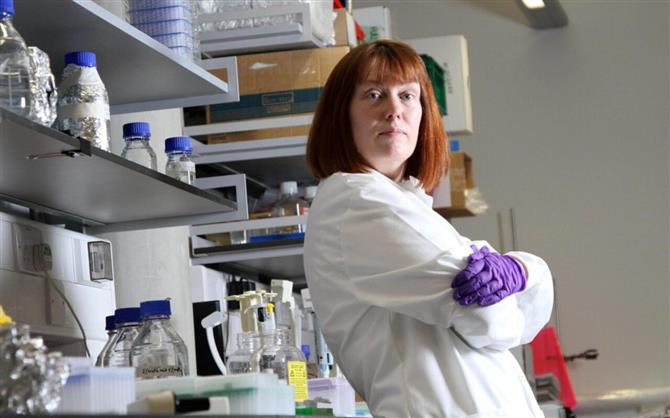New Delhi: Oxford scientists have said that the COVID-19 jab they are developing has an 80 per cent chance of success.
Human trials on a possible coronavirus vaccine being developed by an Oxford University team headed by its professor of vaccinology, Sarah Gilbert, are supposed to begin on Thursday, Britain’s secretary of state for health, Matt Hancock, has announced.
He has given her £20 million to fund her research but he is also allocating £22.5 million to another team at Imperial College London headed by Robin Shattock, professor of mucosal infection and immunity. So in the best scientific tradition, it is now a race to see who gets there first.

Oxford University team headed by its professor of vaccinology, Sarah Gilbert
If Britain is to lead the world out of the coronavirus pandemic, it certainly has a background of scientific achievement, being the land of everyone from Isaac Newton to Charles Darwin, Francis Crick, Michael Faraday, Alexander Fleming, Peter Higgs, William Thomson, J J Thomson, John Dalton, Ernest Rutherford, William Bragg, not to forget Stephen Hawking (his daughter Lucy has said that the ventilator her father had bought for himself has been donated to the Royal Papworth Hospital).
The start of the human trials leads some of Britain’s national newspapers on Wednesday — for example, “British human vaccine trials to start tomorrow” (The Times); “Hope as first human vaccine trials start: volunteers to be tested tomorrow after British scientists make rapid progress” (Express); and “UK vaccine trials on humans to start” (Metro).
In Germany, the Federal Institute for Vaccines said that a clinical test for a potential vaccine had been approved, and will be developed together by the US-based Pfizer and the German company BioNtech.
In his live Downing Street news conference on Tuesday, Hancock said: “I’ve told Sarah Gilbert and Robin Shattock, two of our most inspiring scientists, that we are going to back then to the hilt and give them every resource that they need to get the best possible chance of success as soon as possible.
“After all, the upside of being the first country in the world to develop a successful vaccine is so huge that I am throwing everything at it,” he declared.cc
More than 80 teams around the world are currently working to develop a vaccine for COVID-19, with some at clinical trial stages. On Thursday (23 April 2020), Oxford University in the UK began trials of a potential coronavirus vaccine on human volunteers.
A day before on Wednesday, regulators in Germany also approved the first trials in the country for a vaccine developed by global pharmaceutical giants BioNtech and Pfizer.
In the UK, the government has announced financial support worth GBP 20 million to the project at Oxford, as well as GBP 22.5 million for another project at the Imperial College London.
UK’s Health Secretary Matt Hancock, who has recovered from COVID-19 himself, said that the government was “throwing everything” at the vaccine projects.
Oxford scientists have said that the COVID-19 jab they are developing has an 80 per cent chance of success, Sky News reported.
The human volunteers have to be in good health and between ages 18-55. They have been offered up to GBP 625, the report said.
Called ChAdOx1 nCoV-19, the potential Oxford vaccine is prepared from a harmless virus found in chimpanzees — which has been genetically engineered to carry a part of the novel coronavirus.
While the World Health Organization has estimated a timeline of 12 to 18 months for developing a safe vaccine, the Oxford researchers have said they could produce a million doses of the experimental vaccine by September this year.
In Germany, the Federal Institute for Vaccines said that a clinical test for a potential vaccine had been approved, and will be developed together by the US-based Pfizer and the German company BioNtech.
The German project in its first stage will have 200 participants between the ages of 18 and 55. In the second stage, those more at risk from the disease will be tested.
The vaccine, called BNT162, will also undergo trials in the US after regulatory approvals for human testing are obtained in that country.
Apart from Germany and the UK, several laboratories around the world are working on developing a coronavirus vaccine, including in China, Australia, the US, and other European countries.
As per a report in The Independent, 86 teams are currently working around the world to develop a vaccine for COVID-19, with some at clinical trial stages.